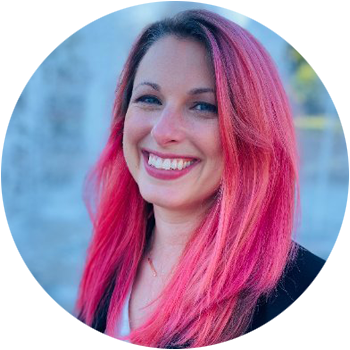4 Hours | 4 CEs
This on-demand professional training program on Correctional Mental Health is presented by Virginia Barber-Rioja, Ph.D., and Ashley Batastini, Ph.D.
This badge-earning program can be shared digitally on platforms like LinkedIn or your resume and counts towards a certificate. Enroll in this program to earn credit towards the Correctional Mental Health Certificate and share your new digital credentials with prospective employers and colleagues.
The U.S. incarcerates far more people than any other country in the world. The incarcerated population is overrepresented by people of color, LGBTQ persons, and people with extensive behavioral health needs, including mental health, substance use, and trauma-related disorders. Specifically, individuals with mental illness account for a significantly large proportion of those incarcerated, making jails the largest psychiatric treatment facilities in the country.
The U.S. correctional system provides plenty of opportunities for mental health professionals to contribute their science as clinicians, researchers, and policy advocates. Adequate mental health interventions are essential to prevent suicide and violence, mitigate stress, and overall increase the chances of rehabilitation and recovery. However, the delivery of mental health services in correctional settings is challenging, and resources are often limited. Furthermore, even though mental health practice and research in correctional settings require specialized knowledge, correctional clinicians, administrators, and scholars have few resources to guide their practice.
This program provides an overview of the practice of correctional mental health. The program starts with an overview of the U.S. The correctional system, including the difference between jails and prisons and different systems of incarceration (e.g., state, federal, immigration, military). The program reviews the different competencies required for clinical practice and research in jails and prisons, including screening and assessment, treatment, management of suicidal and violent behaviors, and ethical issues and professional values. This program is primarily based on didactic content. However, for selected topics, the presenters incorporate case studies.
The key topics include:
- Introduction to the US Correctional System:
- Jails vs. prisons and different systems of incarceration
- Mass incarceration
- Overrepresentation of behavioral health issues in incarcerated individuals
- Constitutional rights to treatment of incarcerated individuals
- Roles of mental health professionals in jails/prisons
- Correctional mental health: relevant areas of competency
- screening and assessment
- treatment
- management of non-suicidal self-injury (NSSI) and other suicidal behaviors
- management of disruptive/violent behaviors
- management of substance use disorders
- management of trauma-related clinical presentations
- Restrictive housing
- Multicultural, structural, and racial inequality considerations
- Ethical and legal issues
- Research and advocacy
This program is intended for early mental health professionals who want to work in jails/prisons or currently work in jails/prisons; students interested in pursuing a career in correctional mental health or completing practicums in jails/prisons; or academics who want to pursue research in jails/prisons.

Intended Audience
This on-demand professional training program is intended for mental health and other allied professionals

Experience Level
This on-demand professional training program is appropriate for beginner, intermediate, and advanced level clinicians.

CE / CPD Credit
APA, ASWB, CPA, NBCC Click here for state and other regional board approvals.
Learning Objectives
Upon completion of this program you will be able to:

Describe the U.S correctional system and the overrepresentation of individuals with behavioral health issues within this system

Describe the different roles that mental health professionals can play within the US correctional system

Describe the different competencies required to practice correctional mental health and to conduct research in jails/prisons

Describe the ethical and legal issues involved in the practice of correctional mental health

Curriculum
1. The Correctional Mental Health Landscape
2. Best Practices in Assessment and Treatment
3. Research in Correctional Mental Health
Develop a Specialty Area of Practice
Transforming mental health professionals into experts
Expert Instructors
Professional training developed and delivered by the field's leading experts

CE Credit
Earn CE credit for meaningful professional training that will elevate your practice
Convenience & Flexibility
Learn at your own pace, from wherever you might be!

Earn Certificates
This is badge-earning course, which means it will help you earn a certificate that can be showcased on digital platforms like Linkedin.
CE Sponsorship Information
Palo Alto University, Continuing and Professional Studies (CONCEPT) is approved by the American Psychological Association to sponsor continuing education for psychologists. Palo Alto University, Continuing and Professional Studies (CONCEPT) maintains responsibility for this program and its content. Palo Alto University, Continuing and Professional Studies (CONCEPT) is approved by the Canadian Psychological Association to offer continuing education for psychologists. Palo Alto University, Continuing and Professional Studies (CONCEPT), SW CPE is recognized by the New York State Education Department’s State Board for Social Work as an approved provider of continuing education for licensed social workers #SW-0356 and the New York State Education Department’s State Board for Mental Health Practitioners as an approved provider of continuing education for licensed mental health counselors. #MHC-0073. Palo Alto University, Continuing and Professional Studies (CONCEPT) has been approved by NBCC as an Approved Continuing Education Provider, ACEP No. 6811. Programs that do not qualify for NBCC credit are clearly identified. CONCEPT Professional Training, #1480, is approved to offer social work continuing education by the Association of Social Work Boards (ASWB) Approved Continuing Education (ACE) program. Organizations, not individual courses, are approved as ACE providers. State and provincial regulatory boards have the final authority to determine whether an individual course may be accepted for continuing education credit. CONCEPT Professional Training maintains responsibility for this course. ACE provider approval period: 11/22/23-11/22/26. Social workers completing this course receive (clinical or social work ethics) continuing education credits.



